EXECUTIVE SUMMARY
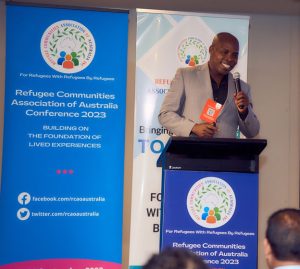 The inaugural Annual Conference of the Refugee Communities Association of Australia Inc (RCAA), held on September 20-21, 2023, was convened under the theme ‘Building on the Foundation of Lived Experiences.’ This landmark Conference brought together refugee communities to initiate ongoing dialogues, share insights, and enhance the capacity of those with direct experiences to realize RCAA’s vision. By centring refugee narratives and lived perspectives, the event created opportunities to build skills, amplify voices, and drive participatory agendas within refugee communities. Furthermore, connections with partners allowed RCAA to align objectives and strengthen partnerships. Guided by RCAA’s vision of integrated, vibrant refugee communities within a cohesive society, the Conference facilitated continuing exchanges, learnings, and collaborations across stakeholders.
The inaugural Annual Conference of the Refugee Communities Association of Australia Inc (RCAA), held on September 20-21, 2023, was convened under the theme ‘Building on the Foundation of Lived Experiences.’ This landmark Conference brought together refugee communities to initiate ongoing dialogues, share insights, and enhance the capacity of those with direct experiences to realize RCAA’s vision. By centring refugee narratives and lived perspectives, the event created opportunities to build skills, amplify voices, and drive participatory agendas within refugee communities. Furthermore, connections with partners allowed RCAA to align objectives and strengthen partnerships. Guided by RCAA’s vision of integrated, vibrant refugee communities within a cohesive society, the Conference facilitated continuing exchanges, learnings, and collaborations across stakeholders.
The two-day Conference convened over 260 delegates daily, representing a diverse range comprising settlement providers, community leaders, academics, and government officials, with majority representation from refugee backgrounds.
Participation spanned over 40 diverse communities, including over 60 presidents and heads of refugee communities along with their leadership. Attendees included representatives from Victoria, other Australian states, and territories, as well as international delegates. Among the delegates were 40 fully sponsored interstate representatives from refugee backgrounds as well as new and emerging communities, whose participation RCAA supported through over 80 scholarships to community organizations needing financial assistance.
The RCAA Gala Dinner attracted 275 guests, including Members of Parliament, faith and community leaders, and international delegates. Generous financial support for the conference came from over 50 organisations including government agencies, service providers, community groups, sporting bodies, and refugee enterprises. The culmination of wide-ranging participation and support underscored the inclusive vision steering this landmark event.
Over the two days 70 speakers joined the panel discussions, presenting on the lived experience journey of refugees, their contribution to Australia and positive stories of collaboration and partnership in the fields of business, sports, and community service. Throughout the Conference, discussions reiterated the importance of policies co-created with refugees, emphasising the need to move beyond symbolic gestures toward genuine inclusivity. Key themes included ethical storytelling, gender-inclusive programming, and grassroots advocacy, advocating for substantive action to support refugees’ meaningful integration into Australian society.
The Conference set a transformative agenda, calling for tangible actions to bridge gaps between rhetoric and implementation. The aim is to create a more inclusive and equitable society for refugees and migrants in Australia, where policies and practices are collaboratively designed to genuinely uplift and integrate refugee communities.
THE CONFERENCE MADE THE FOLLOWING RECOMMENDATIONS.
Holistic Settlement Policies
Develop comprehensive settlement policies in collaboration with refugee communities, prioritising employment, education, housing affordability, access to services beyond social welfare and health services and other crucial needs identified by refugee communities, moving beyond statistical comparisons to address pressing gaps.
The two-day Conference convened over 260 delegates daily, representing a diverse range comprising settlement providers, community leaders, academics, and government officials, with majority representation from refugee backgrounds. Participation spanned over 40 diverse communities, including over 60 presidents and heads of refugee communities along with their leadership. Attendees included representatives from Victoria, other Australian states, and territories, as well as international delegates. Among the delegates were 40 fully sponsored interstate representatives from refugee backgrounds as well as new and emerging communities, whose participation RCAA supported through over 80 scholarships to community organizations needing financial assistance.
Ethical Storytelling Platforms
Establish ethical storytelling platforms that prioritise cultural humility and trauma-informed practices, empowering refugees to share their narratives authentically, fostering healing and understanding.
Gender-Inclusive Programming
Implement gender-inclusive initiatives tailored to the intersectional needs of migrant and refugee women, addressing systemic barriers, and providing targeted support.
Active Refugee Participation
Promote discourse recognising refugees as active contributors to society, fostering avenues for their meaningful participation and contribution within welcoming communities.
Sports for Inclusion
Utilise sports as a means for social inclusion, advocating for diversity promotion within sports and challenging exclusionary attitudes, thereby bridging communities. Youth-Centric Policy Engagement: Engage youth in discussions around identity terminologies, shaping policies collaboratively to reflect evolving identities and foster inclusivity.
Grassroots Advocacy Ecosystems
Support grassroots advocacy initiatives such as advisory boards and participative platforms, amplifying the lived expertise of smaller and minority groups to inform systemic reforms.
Resource Redirection
Redirect funds from deterrence measures towards solutions that harness refugee skills and expertise for mutual benefit, fostering a sense of belonging.
Intersectional Support Frameworks
Develop intersectional support frameworks covering housing, mental healthcare, education, and linguistic accessibility, addressing systemic access gaps for minority groups.
This report summarises key discussions, insights, and outcomes from the two-day Conference encompassing panels, discussions, and speeches. It highlights major themes, policy gaps identified, and shared insights all centred on lived experiences. Focusing on critical areas like refugee narratives, sports, identity, gender lens, and advocacy, the report outlines perspectives and synthesises the discourse on uplifting refugee communities. It documents the pathways envisioned towards greater inclusion, serving as a reference for translating recommendations into collaborative policies and initiatives.
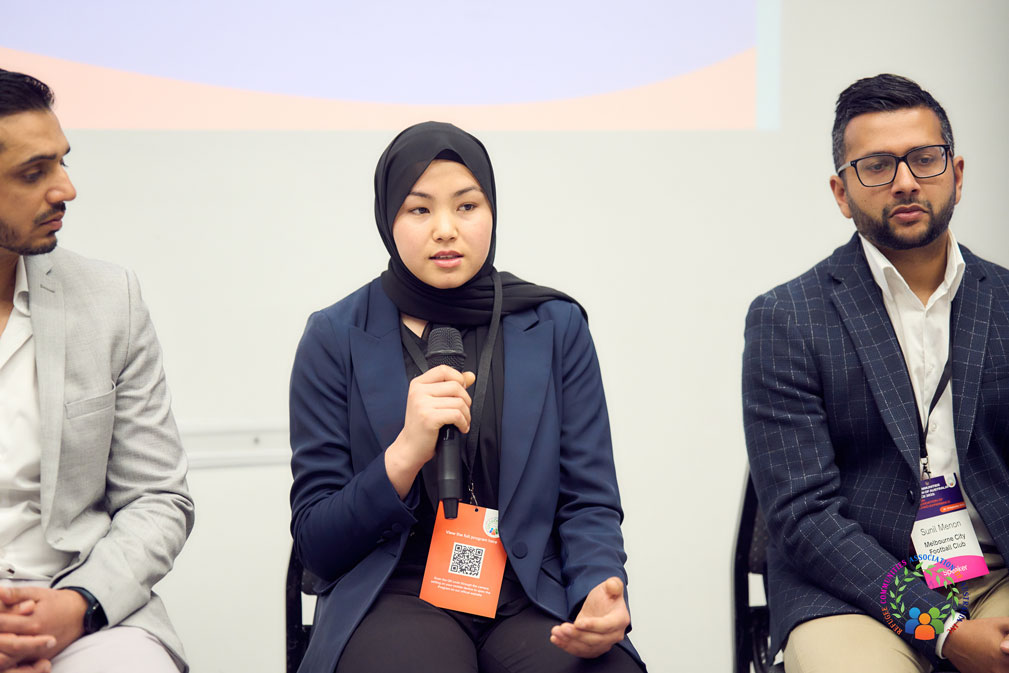
REFUGEES
BEYOND TOKEN GESTURES, UNLOCKING THEIR POTENTIAL

In her opening address Catherine Scarth, Chief Executive Officer of AMES Australia highlighted AMES’ Australia’s 75-year role supporting migrants and refugees to contribute economically and socially. With the Australian Government expanding humanitarian intake to 20,000, Ms Scarth outlined bold aims to annually resettle 50,000 refugees through strong commitments positioning Australia as a global humanitarian leader.
With nearly 50% of Australians being immigrants or children of immigrants, views that multicultural advancement is unrelated to wider communities was challenged. Despite some issues, the speakers admired solidarity between welcoming Australian communities and refugees jointly contributing.
While commending Australia’s openness over European assimilation models, advocates critiqued systems for not enabling genuine social inclusion for resettled refugees. They called to redirect funding from harsh deterrents to solutions harnessing refugee expertise.
Probing deeper, it was highlighted that well-intended assimilation policies overlook gaps between facilitating economic inclusion versus lasting social integration for refugees seeking meaningful belonging. Questions were raised of what constitutes ‘fairness’ in top-down systems inherently designed without refugee input in co-creating equitable resettlement structures responsive to displaced voices.
Do refugees have enough opportunities to meaningfully contribute talents uplifting both adoptive and resettled communities? Denying avenues to utilise refugees’ capabilities risks unnecessary community conflicts.
Speakers urged moving beyond dated passive victimhood stereotypes towards policies actively co-designed with refugees as key stakeholders, whose lived expertise can build socially equitable environments reflecting grounded realities, not detached policy aspirations. Despite resettlement difficulties, celebrating refugees’ resilience and ingenuity alongside solidarity from welcoming host communities remained vital for overcoming divides.
The two-day Conference convened over 260 delegates daily, representing a diverse range comprising settlement providers, community leaders, academics, and government officials, with majority representation from refugee backgrounds. Participation spanned over 40 diverse communities, including over 60 presidents and heads of refugee communities along with their leadership. Attendees included representatives from Victoria, other Australian states, and territories, as well as international delegates. Among the delegates were 40 fully sponsored interstate representatives from refugee backgrounds as well as new and emerging communities, whose participation RCAA supported through over 80 scholarships to community organizations needing financial assistance.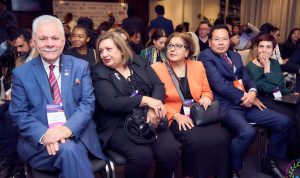
FROM BYSTANDERS TO CHANGEMAKERS
COMMUNITIES DRIVING INCLUSIVE POLICIES
 The participants emphasised that achieving lasting change requires influential grassroots activism alongside top-down leadership jointly addressing systemic barriers. While acknowledging Australia has strong existing refugee infrastructure against global standards, truly proportional minority representation needs genuinely shared efforts between community groups and policymakers.
The participants emphasised that achieving lasting change requires influential grassroots activism alongside top-down leadership jointly addressing systemic barriers. While acknowledging Australia has strong existing refugee infrastructure against global standards, truly proportional minority representation needs genuinely shared efforts between community groups and policymakers.
It was stressed that enabling social and economic participation for refugees and migrants fosters productivity and progress by reflecting diversity. As the panel put it ‘if a business reflects the makeup of the community it serves, it will be successful’. However, major education access gaps continue alongside barriers to services like the National Disability Insurance Scheme, entrenching exclusion.
The group added that amplifying overlooked voices themselves constitutes the catalyst for change by informing responsive policies centred on equity and social cohesion. Fostering collaboration across diverse stakeholders was encouraged towards collectively tackling marginalisation beyond singular domains. Overall, unifying under shared values can uplift excluded groups through purposeful collective action.
GAME CHANGERS
SPORTS AS A BRIDGE FOR MULTICULTURAL BELONGING
Participants explored the immense yet underutilised potential of sports for spearheading diversity agendas by citing experiences of high performing yet socially questioned multicultural athletes. Despite immense contributions to Australian sporting success, cultural acceptance of minorities distressingly appears reactionary rather than unequivocal.
Recurring insights expose systemic identity dilemmas visible minorities navigate in feeling pressured to prove loyalty despite formal citizenship. As Afghanistan National Women’s Football team member Adiba Ganji stated, ‘multicultural people in sports are considered Australian when they are doing well in their sport but then considered as another when they are not or are perceived as not doing well’. Adiba added that sports can propel radical change by proudly embedding diversity as Australian identity’s essence over superficial exceptionalism tests of belonging for minorities. Policy recommendations for driving paradigm shifts included establishing multicultural sports bodies, organically celebrating values, reviewing exclusionary attitudes, and banning discriminatory barriers preventing teams reflecting Australia’s diversity.
The discussion underscored sport’s potential to reconcile communities by celebrating role models. Reclaiming national sporting dialogues from narrow visions can permeate all spheres. Sports remain perfectly positioned to spearhead necessary conversations reconciling communities through cooperation, reforms addressing structural barriers and rewriting dominant narratives celebrating diversity intrinsically, not just tolerating intersectionality.
MULTICULTURAL FRAMEWORK REVIEW
WHAT DOES ‘MULTICULTURAL’ REALLY MEAN TODAY?
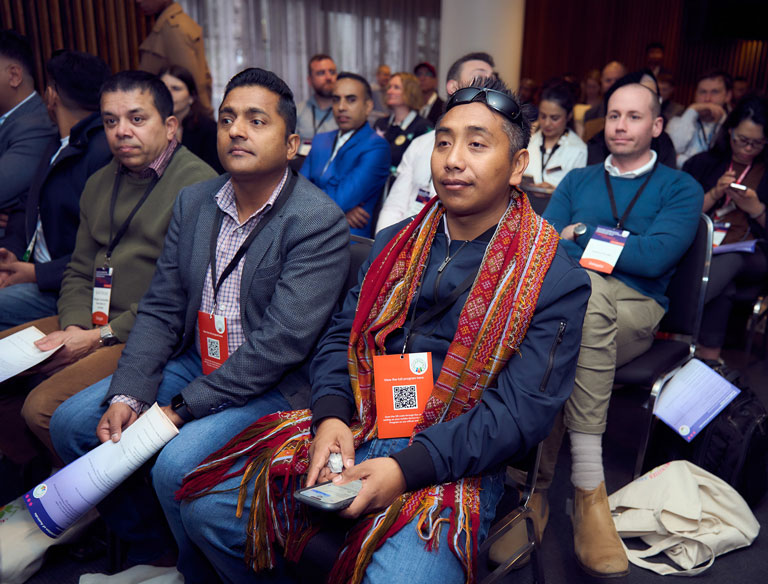 In a thoughtful analysis of policy gaps, Nyadol Nyuon OAM – Executive Director of Sir Zelman Cowen Centre discussed themes emerging from the Multicultural Framework Review consultations. The Review seeks to examine cooperative approaches between the government and the communities to promote an integrated multicultural society and drive a dynamic, prosperous future for Australians. Ms Nyuon elaborated on consultation themes. She discussed the tricky issues around promoting diversity on the world stage while still facing ongoing barriers locally that question how real that diversity is. She added ‘when we succeed, we are Australians and when we do not, we are told to go back to where we came from’.
In a thoughtful analysis of policy gaps, Nyadol Nyuon OAM – Executive Director of Sir Zelman Cowen Centre discussed themes emerging from the Multicultural Framework Review consultations. The Review seeks to examine cooperative approaches between the government and the communities to promote an integrated multicultural society and drive a dynamic, prosperous future for Australians. Ms Nyuon elaborated on consultation themes. She discussed the tricky issues around promoting diversity on the world stage while still facing ongoing barriers locally that question how real that diversity is. She added ‘when we succeed, we are Australians and when we do not, we are told to go back to where we came from’.
Noting grassroots voices have great unused power to drive positive change, Ms Nyuon asked if ‘CALD’ and ‘multicultural’ groups really connect with diverse youth who feel those labels don’t fit their fluid sense of self across overlapping social and cultural environments. Critically, she highlighted that reconciling the contradiction between Australia advocating global diversity celebrations while substantial divisions continue domestically necessitates moving beyond rhetorical policy commitments. Instead, it requires mobilising and amplifying community activism that leverages lived experiences to drive meaningful systemic change. Her message strongly said achieving real equal inclusion is about more than pointing out failures; minorities must turn lived knowledge into tangible policies genuinely addressing exclusion by championing accessible, shared leadership.
OUR STORIES, OUR POWER
ETHICAL STORYTELLING FOR HEALING AND UNITY
Leading a discussion on ethical issues around marginalised people’s storytelling, a discussion focused on context, platforms, purposes and processes for minorities narrating lived experiences. Underscoring that ‘our stories aren’t commodities,’ the panel stressed the importance of amplifying marginalised voices and enabling excluded groups to share lived experiences in their own words and on their own terms.
There are risks in thinking of storytelling as only advocacy. Advocacy can slip into misrepresenting complex identities. Participants were urged to inhabit refugee perspectives. This was about jointly building safe spaces, both in organisations and media.
Though noting Australia’s robust refugee resettlement program, the advocates stressed statistical comparisons cannot justify inaction – policy improvements and targeted solutions remain vital to conclusively close persistent gaps like housing affordability. With refugees historically and culturally vital parts of Australia’s fabric not guests, their human rights treatment must reflect this core positioning. Moreover, the government is proposing expanding the annual humanitarian intake to 27,000 permanent resettlement places. This echoes Australia’s past generous resettlement of displaced persons. It was highlighted that substantively sustaining such a large intake increase relies on upgrading support structures.
BEYOND BENCHMARKS
BUILDING A SETTLEMENT SYSTEM THAT WORKS FOR ALL
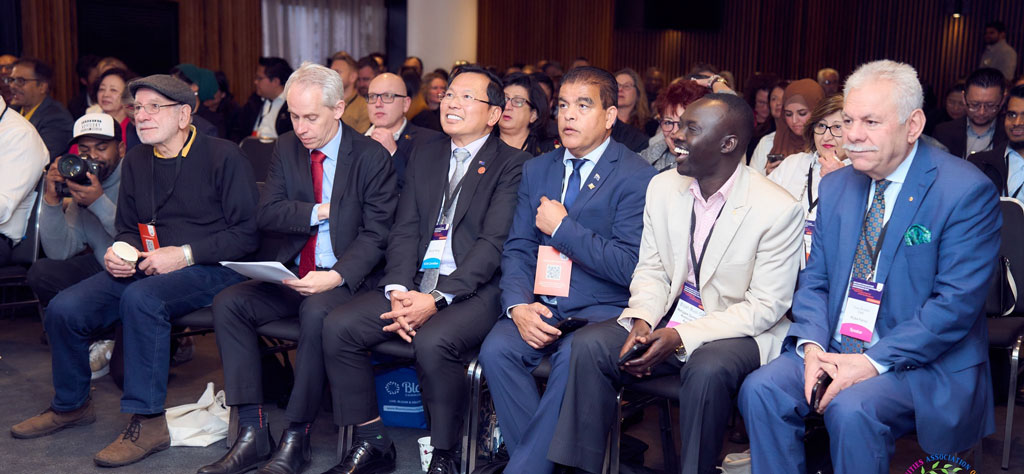
The discussion on refugee resettlement led by Adrian Edwards, UNHCR Representative Australia, New Zealand, PNG and Pacific included senior Australian and international delegates. The discussion reinforced earlier calls to expand progressive approaches in Australia’s refugee resettlement without just comparing numbers which risks missing urgent policy gaps needing real action. Building on earlier talks, the speakers underlined the need to change how we discuss refugee resettlement and integration – from seeing refugees as just passive aid recipients to understanding resettlement as a shared responsibility between Australia and new citizens. One participant emphasised that ‘meaningfully consulting refugee communities and in a non-tokenistic way is crucial in providing relevant and tangible support’. They stressed reconciling outdated views will shape a shared vision where refugees get fair access and in return enrich communities economically and culturally.
Though noting Australia’s robust refugee resettlement program, the advocates stressed statistical comparisons cannot justify inaction – policy improvements and targeted solutions remain vital to conclusively close persistent gaps like housing affordability.
With refugees historically and culturally vital parts of Australia’s fabric not guests, their human rights treatment must reflect this core positioning. Moreover, the government is proposing expanding the annual humanitarian intake to 27,000 permanent resettlement places. This echoes Australia’s past generous resettlement of displaced persons. It was highlighted that substantively sustaining such a large intake increase relies on upgrading support structures.
Specifically, it relies on policies actively designed with refugee communities themselves, not detached bureaucratic planning. The settlement panel put forward an aspirational policy vision for Australia as a principled global leader championing progressive refugee inclusion. However technical benchmarks alone cannot address ethical gaps. The central discourse must permanently shift towards unequivocally respecting universally fundamental human rights as moral pillars for building an equitable society where diversity sustains communities.
MIGRANT WOMEN
BREAKING BARRIERS, BUILDING BRIGHTER FUTURES
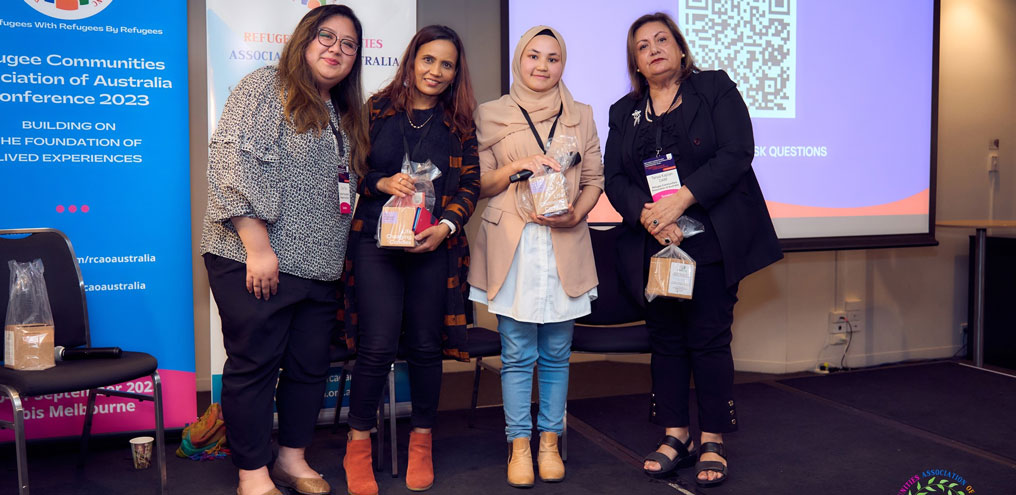
A group discussion focused on refugee and migrant women’s views. It pointed out major shortcomings in mainstream policies. These policies routinely ignore the complex, overlapping issues minority women face as financial providers, cultural custodians, and family caregivers when resettling. Participants criticised simplistic resilience notions in refugee discussions. These notions idealise the concept of endless coping and survival in ways that reduce focus on structural barriers. Such barriers underlie conflict trauma, displacements, and difficult resettlements experienced by vulnerable women.
Additionally, there was an emphasis on how current support services often compound gendered problems. Concerns included excessive focus on competitive bureaucratic contracting that increasingly compromises care standards. This discourages non-profits from collaborating on unfunded after-hours critical help. It also hinders services from tailoring long-term empowerment strategies to address cultural intersections.
A panel member gave account of a women who cried after she came back from doctor, because she had asked her son for the first time to translate female health issues to the doctor as her English was poor. The woman added ‘we came here for our children, but I feel I’m a child here, not a mother’.
Advocates jointly reinforced calls to reform by extending flexible settlement support windows considering women’s compounded duties. Embracing justice requires adopting intersectional, trauma-aware frameworks that meaningfully amplify diverse women’s voices to jointly shape more equal and accessible systems.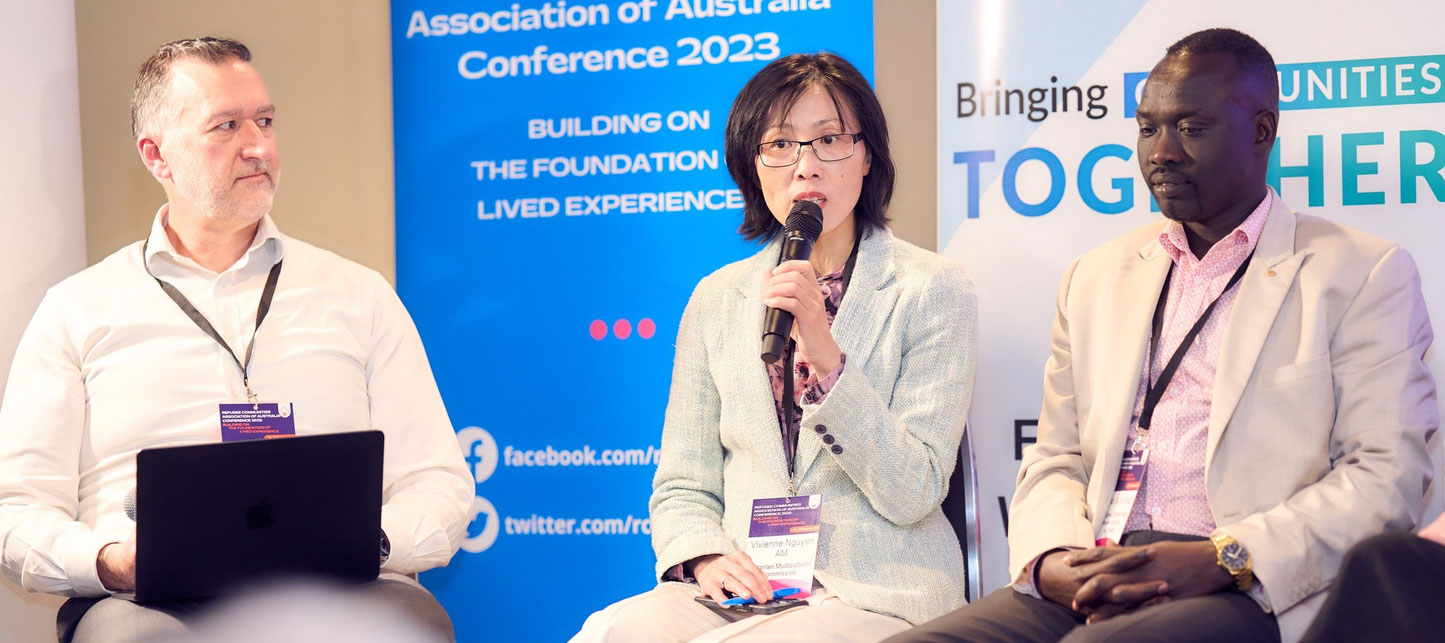
MINISTERIAL ADDRESS
 The Hon Andrew Giles MP, Minister for Immigration, Citizenship and Multicultural Affairs, delivered the Ministerial Speech at the Conference. The Minister highlighted the Australian Government’s commitment to supporting refugees and celebrating diversity. He added ‘we know that we must ensure that refugees can meet their full potential here, whether that be at home, in their local communities, at school or in the workplace’. The Minister added that the Australian Government has delivered the full humanitarian intake of almost 18,000 refugees for 2022-23 and will increase the annual intake to 20,000 going forward. Alternative humanitarian visa pathways are also being expanded through the Community Support Program, and Community Refugee Integration and Settlement Pilot. The Minister underlined that the ‘Government is determined to change the tone of our debate around refugees to one that is anchored in compassion’.
The Hon Andrew Giles MP, Minister for Immigration, Citizenship and Multicultural Affairs, delivered the Ministerial Speech at the Conference. The Minister highlighted the Australian Government’s commitment to supporting refugees and celebrating diversity. He added ‘we know that we must ensure that refugees can meet their full potential here, whether that be at home, in their local communities, at school or in the workplace’. The Minister added that the Australian Government has delivered the full humanitarian intake of almost 18,000 refugees for 2022-23 and will increase the annual intake to 20,000 going forward. Alternative humanitarian visa pathways are also being expanded through the Community Support Program, and Community Refugee Integration and Settlement Pilot. The Minister underlined that the ‘Government is determined to change the tone of our debate around refugees to one that is anchored in compassion’.
The Minister emphasised the importance of refugee voices in policy development. He added that consultations informed the new permanent visa pathway for temporary protection visa holders, providing over 7,000 people certainty to rebuild lives in Australia. On the importance of lived experience, minister pointed out that majority of members of government’s Settlement Advisory Council have lived refugee experience, to provide advice on all aspects of Australia’s settlement programs.
He further mentioned that in shaping national and international dialogue and policy on refugees, the government has stablished the Australian Refugee Advisory Panel that will provide a formal mechanism for meaningful refugee participation in Australia’s international engagement.
Minister Giles updated on the Multicultural Framework Review (MFR) being conducted across Australia in 50 years after the first multicultural policy was implemented by the Whitlam Government. He further stated that the review is evaluating the effectiveness of existing policies and programs in promoting social inclusion, and respect for diversity, will identify areas for improvement.
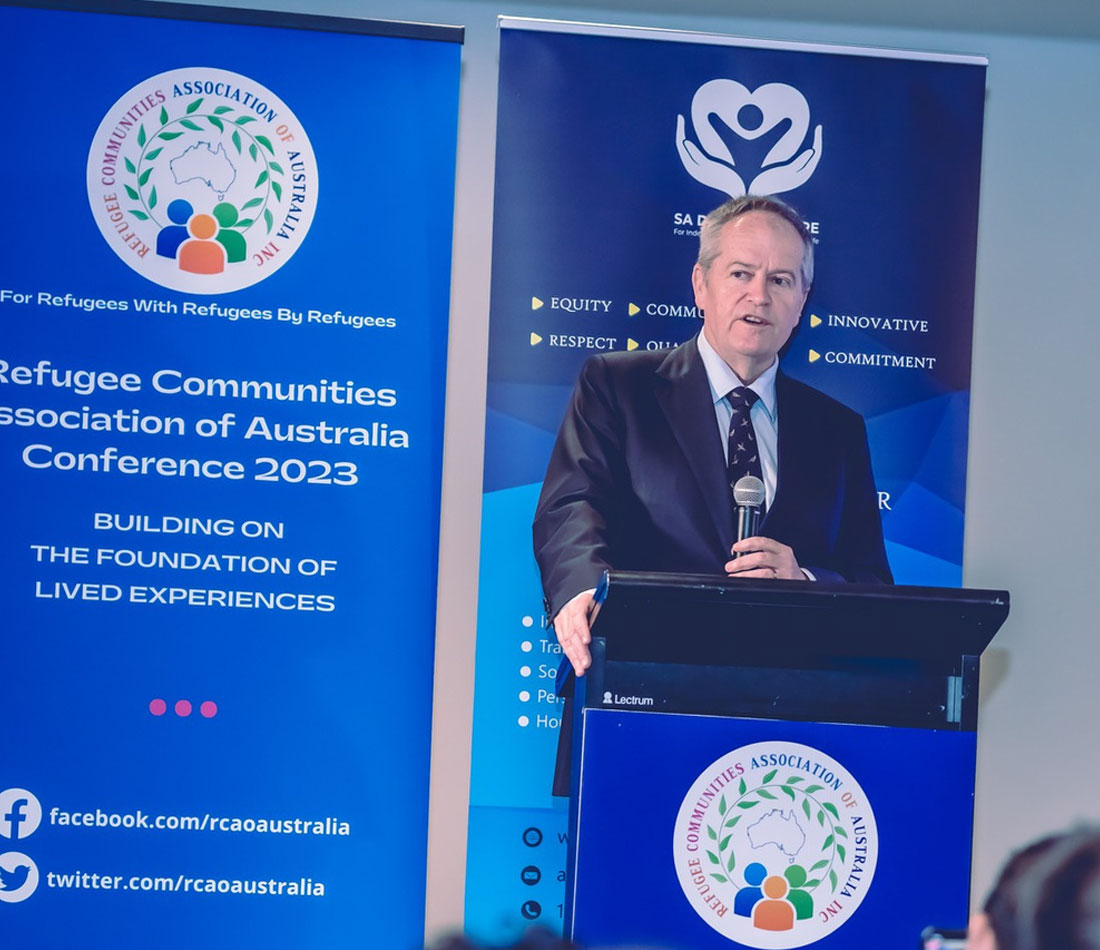 The government for the first time has made MFR available in 35 languages for every part of Australian community to contribute. Minister said, “We want to hear from a range of voices sharing their lived experiences, their views on what is working well and what could be improved to advance our multicultural nation. He further stated that Government is presently conducting a review of the Multicultural Framework to ensure that services and policy structures promote social cohesion and inclusion within a multicultural Australia, while concurrently harnessing the diverse talents of all Australians in order to advance the nation. Minister Giles emphasised that ‘we must engage in a genuine dialogue with rather than consultation as an afterthought”.
The government for the first time has made MFR available in 35 languages for every part of Australian community to contribute. Minister said, “We want to hear from a range of voices sharing their lived experiences, their views on what is working well and what could be improved to advance our multicultural nation. He further stated that Government is presently conducting a review of the Multicultural Framework to ensure that services and policy structures promote social cohesion and inclusion within a multicultural Australia, while concurrently harnessing the diverse talents of all Australians in order to advance the nation. Minister Giles emphasised that ‘we must engage in a genuine dialogue with rather than consultation as an afterthought”.
The Hon Bill Shorten MP, Minister for the National Disability Insurance Scheme (NDIS), Minister for Government Services delivered an important speech. Minister Shorten emphasised that Australia has pioneered progressive institutions like aged pension, Medicare, superannuation, and the NDIS that support the community. The NDIS provides innovative, well-funded and self-directed support enabling early interventions and participation.
He pointed out that the need for the NDIS in the multicultural communities is higher due to specific cultural needs of the communities; one size does not fit all. This is despite the fact that Culturally and Linguistically Diverse (CALD) communities access the NDIS less than broader Australian community, suggesting possible unmet demand. He added that following reforms, the NDIS CALD Strategy 2023-2027 aims to: 1) Increase CALD access, 2) Optimise use, 3) Improve experiences. The Minister concluded by saying that the NDIS requires refinement, not slashing. The goal is growing participation and investment. More community-based disability supports are needed, building on CALD networks. The Government is working to make the NDIS more accessible so that CALD communities can better meet their needs and CALD NDIS businesses are better represented in providing NDIS services.
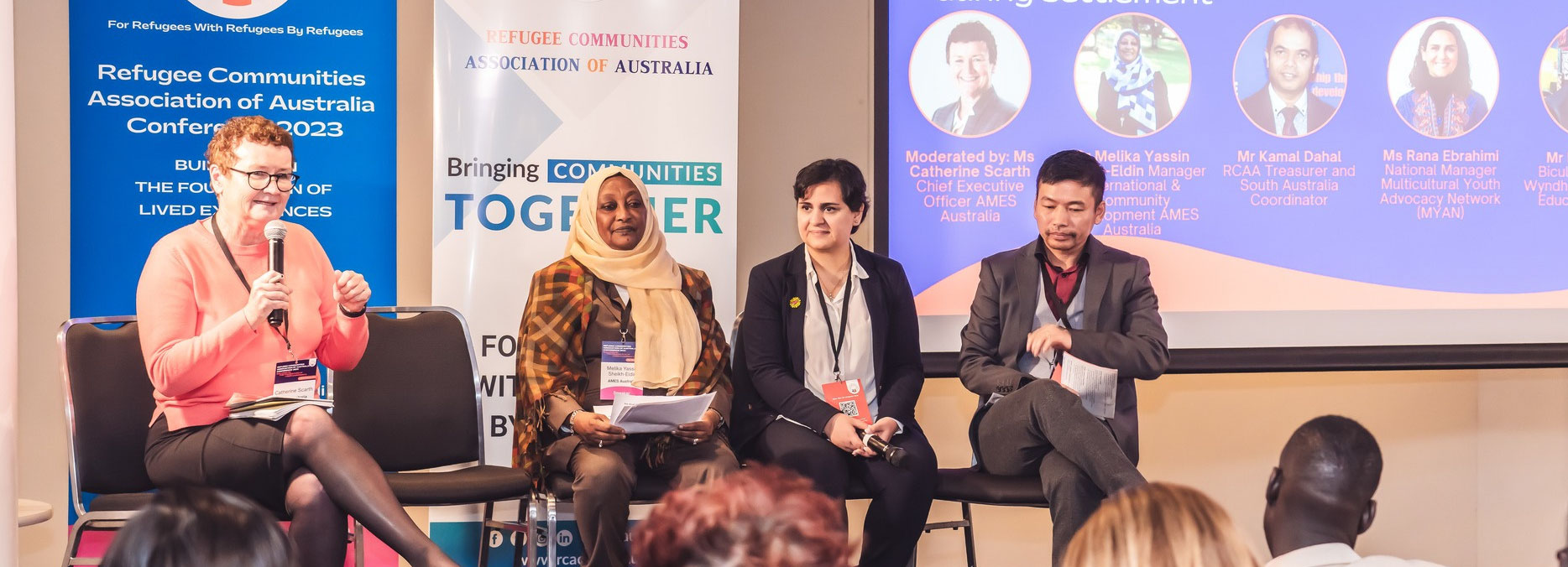
INTERNATIONAL PERSPECTIVES CALL FOR
GREATER REFUGEE COLLABORATION
International speakers and refugee experts addressed the Conference, providing global and regional perspectives and insights relevant to the Australian and RCAA contexts. The panel noted that refugee issues extend beyond borders, emphasising that the displacement and resettlement of refugees is a global concern. They highlighted that conflicts and crises across the world continue to drive large refugee populations, with developing countries hosting the majority of refugees. Participants called for facilitating greater engagement of diaspora communities with international agencies and refugee programmes. This includes cooperation with the UNHCR on policy development, participating in initiatives to support refugees worldwide, and enabling partnerships between refugees in Australia and refugee communities in camps overseas.
The panellists discussed and shared their first-hand experience on how refugee issues require coordinated international responses and shared responsibility, and how and what role RCAA can play in working with the Australian Government and international agencies to support refugee communities in Australia.
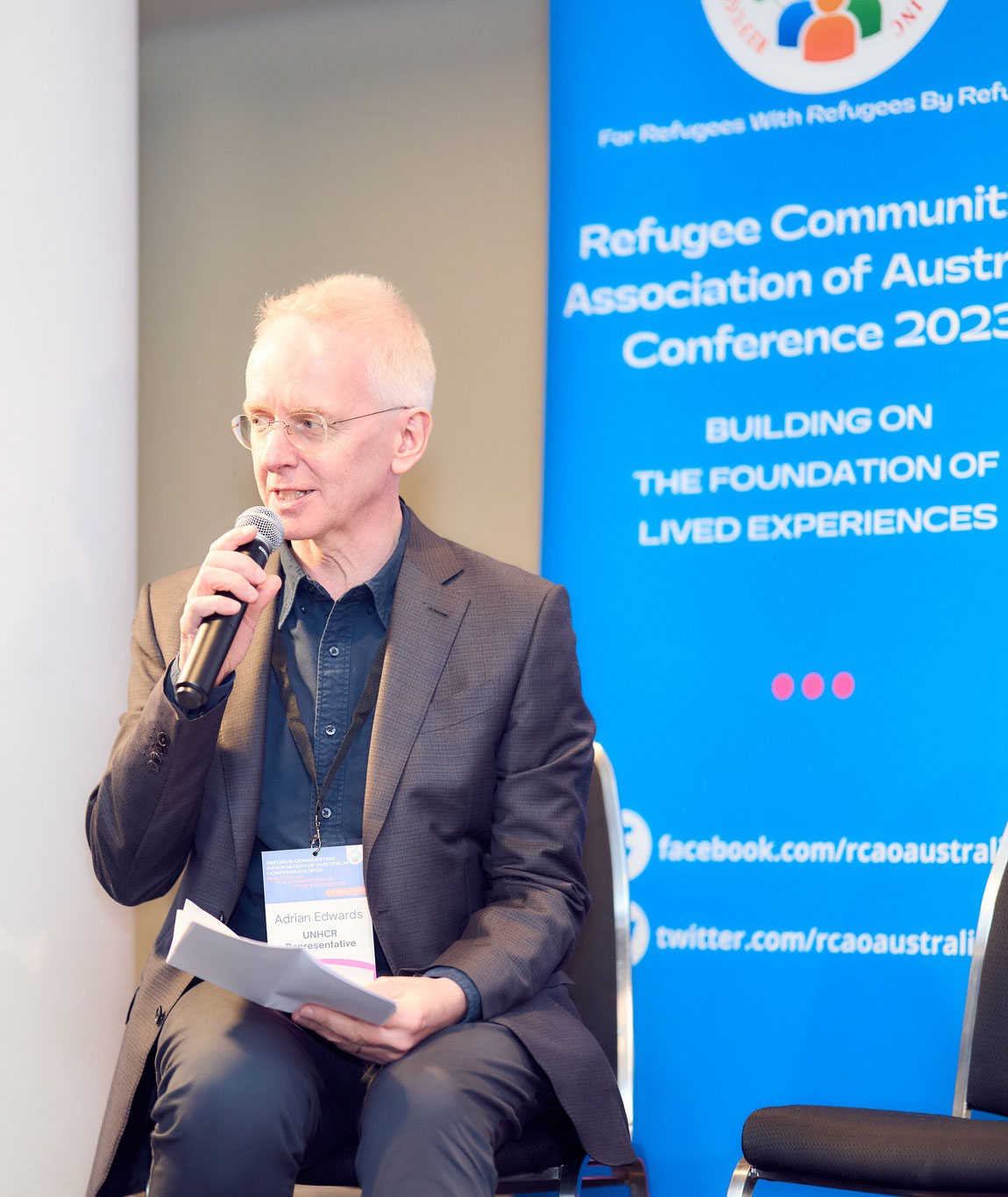
CONCLUSION
ADVANCING REFUGEE INCLUSION THROUGH UPLIFTING VOICES
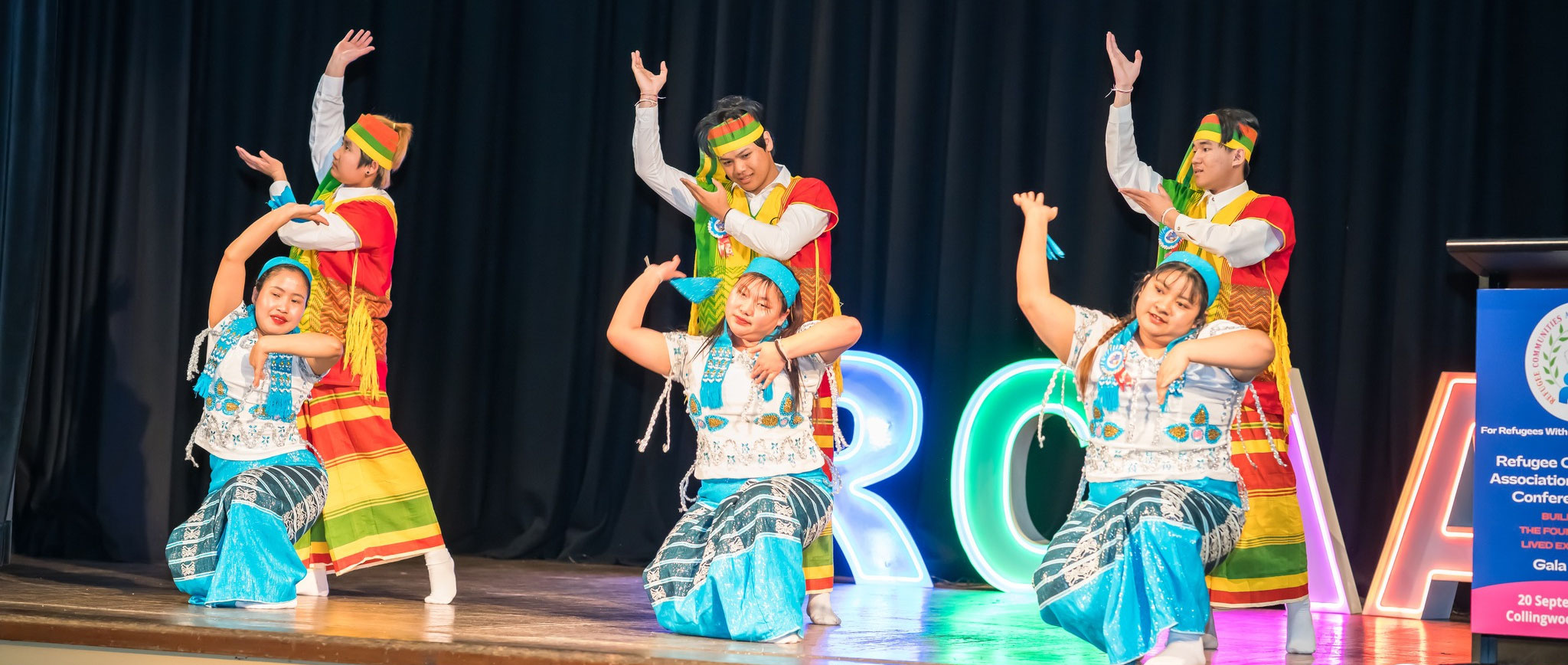
Over the two days of the Conference over 70 speakers and moderators and delegates insightfully deliberated on and discussed issues and challenges faced by refugees and migrants. They also discussed opportunities and potential collaborations for bolstered advocacy, improved humanitarian resettlement, expanded refugee skills development, and greater empowerment. Moreover, the Conference emphasised narrative storytelling and the sharing refugees’ success stories, including thriving enterprises and contributions within sporting fields. Such accounts underscore the socioeconomic development of Australia enabled by refugees. The Conference critically highlighted systemic gaps in the current settlement services spanning healthcare access, housing, community welfare, sports, media representation, university pathways, mental health help and disability structures.
Across panels, experts and people with lived experience including refugees stressed lack of diversity and tokenistic approaches in service provision, employment, civic participation, and leadership positions. The panellists discussed and shared insights on pragmatic, inclusive systems that meet the distinct needs of CALD groups. Such systems would empower refugees and migrants to thrive within their own communities.
Additionally, inclusive support would enable them to actively contribute their vibrancy to the wider Australian community. The Conference emphasised that achieving substantive inclusion requires moving beyond tokenistic gestures and effectively incorporating refugee perspectives into solution design. Genuine integration can only happen when refugees are positioned as key stakeholders with valued lived expertise, not just passive aid recipients.
By amplifying marginalised voices and lived experiences of refugees themselves, the Conference laid the groundwork for transformative reforms founded on principles of social equity, trauma-informed care, and participatory policymaking. Participation of international speakers including the UNHCR, and other organisations enriched these conversations by bringing global perspectives on refugee challenges, and contextualising to the issues, challenges and opportunities in Australia.
The Conference reiterated that diversity is integral to Australia’s cultural fabric and national identity. But celebrating multiculturalism substantively means upholding inclusive values daily through purposeful individual and collective action and embracing diversity and multiculturalism as the way of life for the Australian nation. All stakeholders must jointly commit to an ongoing journey of reconciliation, healing historical divides and bridging gaps between rhetoric and reality.

